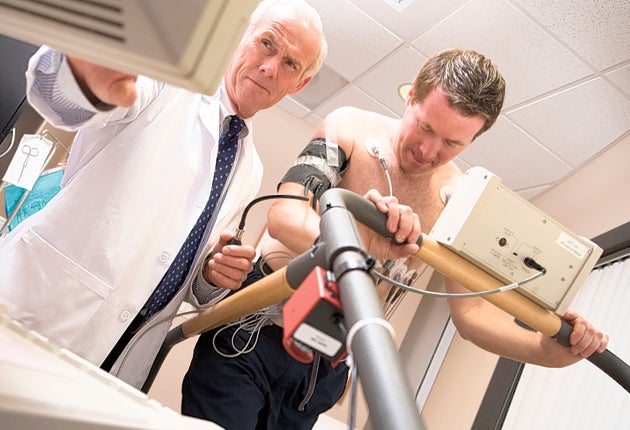The £1,000 body scans that ought to come with a health warning
BMA fears patients are being exploited by 'unreliable and inaccurate' private tests

Doctors' leaders today demand curbs on the boom in private screening clinics offering services ranging from simple blood-pressure checks to full body scans costing more than £1,000.
Patients are being exploited by "irresponsible" marketing of private health screening tests, the British Medical Association and the Academy of Royal Medical Colleges say in a letter to health secretary Andrew Lansely.
Screening tests can harm in two ways. First, there's the positive result that triggers further investigation and treatment but which turns out to be a false alarm, thus subjecting the individual to unnecessary anxiety and pain. And second, there's the negative result that lulls the individual into a false sense of security – until the disease that has been lurking undetected strikes.
In a joint statement, Hamish Meldrum, chairman of the BMA and Professor Sir Neil Douglas, chairman of the Academy, warn that there are "significant risks" with direct-to-consumer tests. They say private companies are highlighting the benefits of screening while ignoring or playing down the risks.
"Many are unreliable and inaccurate. Patients may be falsely reassured, or undergo unnecessary and sometimes invasive follow-up tests and treatments. Unnecessary procedures may have long-term or permanent complications. These problems often create unnecessary burdens for mainstream NHS services."
The statement does not mention specific tests but one that is widely promoted is a blood test for prostate cancer which measures the level of prostate specific antigen (PSA). Research shows that seven in 10 men with a high reading will not have cancer. Worse, two in 100 with a low reading will have significant cancer. So a lot of men will get treatment they don't need, and some will not get treatment they do.
For those with a high reading, the next stage is a biopsy. This is a painful procedure in which a hollow needle is inserted into the gland close to the rectum and a sample of tissue removed to be examined for the presence of malignant cells.
As the PSA level is a poor predictor of prostate cancer, there is noNHS screening programme. Men are advised to be tested only if they have symptoms, such as difficulty urinating, or a family history of the cancer.
If cancer is found, it may lead to surgery – with its risks – followed by radiotherapy and chemotherapy, which have side effects. But the cancer may not need treating. Prostate cancer is often slow-growing, and many men die with it rather than from it. For them, screening and treating the cancer brings pain and anxiety – and no health benefit.
In the case of whole body scans, sometimes marketed as the "ultimate health check" or "health MOT" for a milestone birthday at 40, 50 or 60, the promise is that it can offer more accurate checks than are usually carried out by old-fashioned family doctors. The problem is that most scans throw up abnormalities – and if the patient is paying £1,000-plus they are unlikely to feel satisfied with a report that says simple "all's well". The clinic may feel under pressure to highlight any abnormalities.
But distinguishing those that are benign from those that indicate serious disease is often difficult. The risk is instead of bringing extra years of life the scans will bring years of anxiety.
An American patient who had a whole body scan described how it threw up an early warning of lung cancer. He had a lung biopsy after a nodule was detected but it turned out to be a healed scar, posing no threat. However, the investigation involved four days in hospital, a painful procedure, several weeks of recuperation - and a $47,000 (£25,000) bill at the end.
In their letter Dr Meldrum and Professor Douglas call on the government to introduce tougher regulations on the marketing of private screening tests to ensure it is factual and balanced. They say clinics must include information on the risks and limitations of the tests, the implications of the results, the procedures not included in the price and the evidence of health benefit. Dr Meldrum said: "Some private companies are taking advantage of vulnerable people by claiming the health screening they offer will detect diseases early or reduce an individual's risk of developing specific illnesses.
"However, the NHS has safeguards in place to ensure the public can be confident the tests are supported by sound research evidence. This ensures that anyone having a test is aware of the benefits, risks and limitations involved.
"Such safeguards often do not exist in the private sector which makes it impossible for people to distinguish between private testing services that may do some good, and those that are of no value or potentially harmful."
Professor Douglas said: "There are significant risks with direct-to-consumer tests. Many are unreliable and inaccurate. Patients may be falsely reassured, or undergo avoidable and invasive follow-up tests and treatments.
"Unnecessary procedures may have long-term or permanent complications which can place a burden on the NHS."
Subscribe to Independent Premium to bookmark this article
Want to bookmark your favourite articles and stories to read or reference later? Start your Independent Premium subscription today.

Join our commenting forum
Join thought-provoking conversations, follow other Independent readers and see their replies